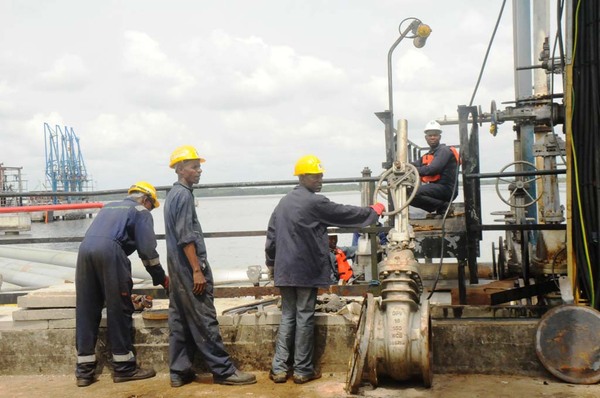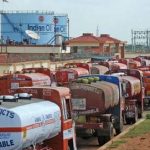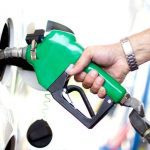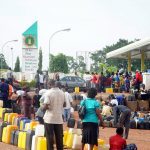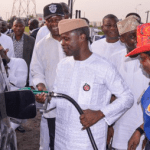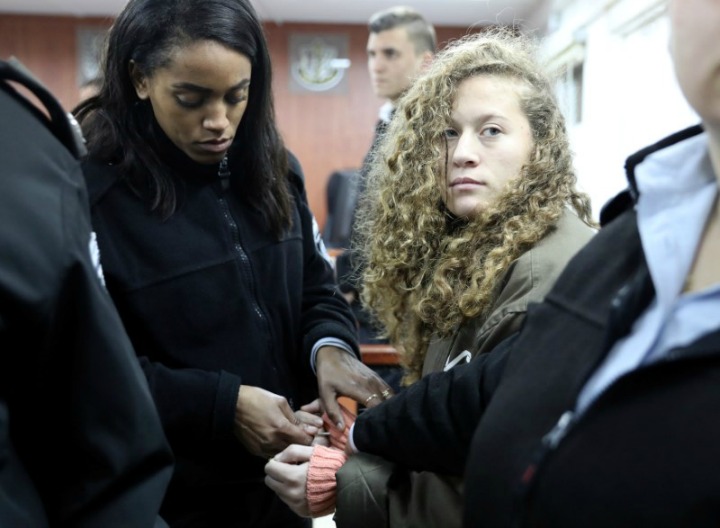 The Nigerian government has declared an eighteen-month emergency period in the downstream sector of the petroleum industry to ensure constant provision of fuel before new refineries come on stream in 2019 to boost domestic supply.
The Nigerian government has declared an eighteen-month emergency period in the downstream sector of the petroleum industry to ensure constant provision of fuel before new refineries come on stream in 2019 to boost domestic supply.
Minister of State for Petroleum, Ibe Kachikwu made the disclosure at a Senate public hearing on the current fuel scarcity where he expressed the readiness of government to restructure the production, importation and distribution of petroleum products in Nigeria.
The Senate public hearing comes on the heels of the acute fuel scarcity which has brought hardship to Nigerians across the country.
Answering questions on what President Muhammadu Buhari’s administration is doing to find lasting solutions, Minister Ibe Kachikwu explained that the landing cost of the product is currently N171 per litre.
He assured that the government is working through three key strategies to bridge the gap in 18 months at the regular price of N145 per litre before new private refineries come on stream in 2019.
One of the major plans that the government says it is considering is whether NNPC should be allowed to import and distribute fuel to its retail stations at 145 per litre while oil marketers are allowed to import fuel and sell at whatever landing cost is arrived at by regulators and the importers.
Kachikwu said a presidential committee is to look for how to cushion the effect within the eighteen months in a way that will ensure availability and effective distribution of fuel without an increase of the product from the current N145 per litre.
Some senators especially the Vice Chairman of the Committee Philip Aduda and Chairman on Gas, Albert Akpan described the payment of the difference between N145 and N171 as subsidy which was not budgeted for in the 2017 or 2018 national budgets.
But Chairman of the downstream committee, Senator Kabiru Marafa asked the Minister and NNPC officials not to answer the questions as a new date will be scheduled for hearing on the proposed augmentation or subsidy by the Federal Government.
The minister also says as long as fuel prices remain around N350 per litre outside Nigeria’s borders, there will continue to be incentives to hoard, smuggle and illegally export fuel outside Nigeria’s porous borders.
NNPC assured Nigerians that it will massively wet the market with about 1.9 billion litres of fuel in January to address current scarcity.
But the government says the solution to the recurring fuel challenge is to massively license more private refineries in Nigeria so that they would compete with public refineries to increase production output thereby reducing importation in the future.
 The Nigerian government has declared an eighteen-month emergency period in the downstream sector of the petroleum industry to ensure constant provision of fuel before new refineries come on stream in 2019 to boost domestic supply.
The Nigerian government has declared an eighteen-month emergency period in the downstream sector of the petroleum industry to ensure constant provision of fuel before new refineries come on stream in 2019 to boost domestic supply.
Minister of State for Petroleum, Ibe Kachikwu made the disclosure at a Senate public hearing on the current fuel scarcity where he expressed the readiness of government to restructure the production, importation and distribution of petroleum products in Nigeria.
The Senate public hearing comes on the heels of the acute fuel scarcity which has brought hardship to Nigerians across the country.
Answering questions on what President Muhammadu Buhari’s administration is doing to find lasting solutions, Minister Ibe Kachikwu explained that the landing cost of the product is currently N171 per litre.
He assured that the government is working through three key strategies to bridge the gap in 18 months at the regular price of N145 per litre before new private refineries come on stream in 2019.
One of the major plans that the government says it is considering is whether NNPC should be allowed to import and distribute fuel to its retail stations at 145 per litre while oil marketers are allowed to import fuel and sell at whatever landing cost is arrived at by regulators and the importers.
Kachikwu said a presidential committee is to look for how to cushion the effect within the eighteen months in a way that will ensure availability and effective distribution of fuel without an increase of the product from the current N145 per litre.
Some senators especially the Vice Chairman of the Committee Philip Aduda and Chairman on Gas, Albert Akpan described the payment of the difference between N145 and N171 as subsidy which was not budgeted for in the 2017 or 2018 national budgets.
But Chairman of the downstream committee, Senator Kabiru Marafa asked the Minister and NNPC officials not to answer the questions as a new date will be scheduled for hearing on the proposed augmentation or subsidy by the Federal Government.
The minister also says as long as fuel prices remain around N350 per litre outside Nigeria’s borders, there will continue to be incentives to hoard, smuggle and illegally export fuel outside Nigeria’s porous borders.
NNPC assured Nigerians that it will massively wet the market with about 1.9 billion litres of fuel in January to address current scarcity.
But the government says the solution to the recurring fuel challenge is to massively license more private refineries in Nigeria so that they would compete with public refineries to increase production output thereby reducing importation in the future.
 The Nigerian government has declared an eighteen-month emergency period in the downstream sector of the petroleum industry to ensure constant provision of fuel before new refineries come on stream in 2019 to boost domestic supply.
The Nigerian government has declared an eighteen-month emergency period in the downstream sector of the petroleum industry to ensure constant provision of fuel before new refineries come on stream in 2019 to boost domestic supply.
Minister of State for Petroleum, Ibe Kachikwu made the disclosure at a Senate public hearing on the current fuel scarcity where he expressed the readiness of government to restructure the production, importation and distribution of petroleum products in Nigeria.
The Senate public hearing comes on the heels of the acute fuel scarcity which has brought hardship to Nigerians across the country.
Answering questions on what President Muhammadu Buhari’s administration is doing to find lasting solutions, Minister Ibe Kachikwu explained that the landing cost of the product is currently N171 per litre.
He assured that the government is working through three key strategies to bridge the gap in 18 months at the regular price of N145 per litre before new private refineries come on stream in 2019.
One of the major plans that the government says it is considering is whether NNPC should be allowed to import and distribute fuel to its retail stations at 145 per litre while oil marketers are allowed to import fuel and sell at whatever landing cost is arrived at by regulators and the importers.
Kachikwu said a presidential committee is to look for how to cushion the effect within the eighteen months in a way that will ensure availability and effective distribution of fuel without an increase of the product from the current N145 per litre.
Some senators especially the Vice Chairman of the Committee Philip Aduda and Chairman on Gas, Albert Akpan described the payment of the difference between N145 and N171 as subsidy which was not budgeted for in the 2017 or 2018 national budgets.
But Chairman of the downstream committee, Senator Kabiru Marafa asked the Minister and NNPC officials not to answer the questions as a new date will be scheduled for hearing on the proposed augmentation or subsidy by the Federal Government.
The minister also says as long as fuel prices remain around N350 per litre outside Nigeria’s borders, there will continue to be incentives to hoard, smuggle and illegally export fuel outside Nigeria’s porous borders.
NNPC assured Nigerians that it will massively wet the market with about 1.9 billion litres of fuel in January to address current scarcity.
But the government says the solution to the recurring fuel challenge is to massively license more private refineries in Nigeria so that they would compete with public refineries to increase production output thereby reducing importation in the future.
 The Nigerian government has declared an eighteen-month emergency period in the downstream sector of the petroleum industry to ensure constant provision of fuel before new refineries come on stream in 2019 to boost domestic supply.
The Nigerian government has declared an eighteen-month emergency period in the downstream sector of the petroleum industry to ensure constant provision of fuel before new refineries come on stream in 2019 to boost domestic supply.
Minister of State for Petroleum, Ibe Kachikwu made the disclosure at a Senate public hearing on the current fuel scarcity where he expressed the readiness of government to restructure the production, importation and distribution of petroleum products in Nigeria.
The Senate public hearing comes on the heels of the acute fuel scarcity which has brought hardship to Nigerians across the country.
Answering questions on what President Muhammadu Buhari’s administration is doing to find lasting solutions, Minister Ibe Kachikwu explained that the landing cost of the product is currently N171 per litre.
He assured that the government is working through three key strategies to bridge the gap in 18 months at the regular price of N145 per litre before new private refineries come on stream in 2019.
One of the major plans that the government says it is considering is whether NNPC should be allowed to import and distribute fuel to its retail stations at 145 per litre while oil marketers are allowed to import fuel and sell at whatever landing cost is arrived at by regulators and the importers.
Kachikwu said a presidential committee is to look for how to cushion the effect within the eighteen months in a way that will ensure availability and effective distribution of fuel without an increase of the product from the current N145 per litre.
Some senators especially the Vice Chairman of the Committee Philip Aduda and Chairman on Gas, Albert Akpan described the payment of the difference between N145 and N171 as subsidy which was not budgeted for in the 2017 or 2018 national budgets.
But Chairman of the downstream committee, Senator Kabiru Marafa asked the Minister and NNPC officials not to answer the questions as a new date will be scheduled for hearing on the proposed augmentation or subsidy by the Federal Government.
The minister also says as long as fuel prices remain around N350 per litre outside Nigeria’s borders, there will continue to be incentives to hoard, smuggle and illegally export fuel outside Nigeria’s porous borders.
NNPC assured Nigerians that it will massively wet the market with about 1.9 billion litres of fuel in January to address current scarcity.
But the government says the solution to the recurring fuel challenge is to massively license more private refineries in Nigeria so that they would compete with public refineries to increase production output thereby reducing importation in the future.
 The Nigerian government has declared an eighteen-month emergency period in the downstream sector of the petroleum industry to ensure constant provision of fuel before new refineries come on stream in 2019 to boost domestic supply.
The Nigerian government has declared an eighteen-month emergency period in the downstream sector of the petroleum industry to ensure constant provision of fuel before new refineries come on stream in 2019 to boost domestic supply.
Minister of State for Petroleum, Ibe Kachikwu made the disclosure at a Senate public hearing on the current fuel scarcity where he expressed the readiness of government to restructure the production, importation and distribution of petroleum products in Nigeria.
The Senate public hearing comes on the heels of the acute fuel scarcity which has brought hardship to Nigerians across the country.
Answering questions on what President Muhammadu Buhari’s administration is doing to find lasting solutions, Minister Ibe Kachikwu explained that the landing cost of the product is currently N171 per litre.
He assured that the government is working through three key strategies to bridge the gap in 18 months at the regular price of N145 per litre before new private refineries come on stream in 2019.
One of the major plans that the government says it is considering is whether NNPC should be allowed to import and distribute fuel to its retail stations at 145 per litre while oil marketers are allowed to import fuel and sell at whatever landing cost is arrived at by regulators and the importers.
Kachikwu said a presidential committee is to look for how to cushion the effect within the eighteen months in a way that will ensure availability and effective distribution of fuel without an increase of the product from the current N145 per litre.
Some senators especially the Vice Chairman of the Committee Philip Aduda and Chairman on Gas, Albert Akpan described the payment of the difference between N145 and N171 as subsidy which was not budgeted for in the 2017 or 2018 national budgets.
But Chairman of the downstream committee, Senator Kabiru Marafa asked the Minister and NNPC officials not to answer the questions as a new date will be scheduled for hearing on the proposed augmentation or subsidy by the Federal Government.
The minister also says as long as fuel prices remain around N350 per litre outside Nigeria’s borders, there will continue to be incentives to hoard, smuggle and illegally export fuel outside Nigeria’s porous borders.
NNPC assured Nigerians that it will massively wet the market with about 1.9 billion litres of fuel in January to address current scarcity.
But the government says the solution to the recurring fuel challenge is to massively license more private refineries in Nigeria so that they would compete with public refineries to increase production output thereby reducing importation in the future.
 The Nigerian government has declared an eighteen-month emergency period in the downstream sector of the petroleum industry to ensure constant provision of fuel before new refineries come on stream in 2019 to boost domestic supply.
The Nigerian government has declared an eighteen-month emergency period in the downstream sector of the petroleum industry to ensure constant provision of fuel before new refineries come on stream in 2019 to boost domestic supply.
Minister of State for Petroleum, Ibe Kachikwu made the disclosure at a Senate public hearing on the current fuel scarcity where he expressed the readiness of government to restructure the production, importation and distribution of petroleum products in Nigeria.
The Senate public hearing comes on the heels of the acute fuel scarcity which has brought hardship to Nigerians across the country.
Answering questions on what President Muhammadu Buhari’s administration is doing to find lasting solutions, Minister Ibe Kachikwu explained that the landing cost of the product is currently N171 per litre.
He assured that the government is working through three key strategies to bridge the gap in 18 months at the regular price of N145 per litre before new private refineries come on stream in 2019.
One of the major plans that the government says it is considering is whether NNPC should be allowed to import and distribute fuel to its retail stations at 145 per litre while oil marketers are allowed to import fuel and sell at whatever landing cost is arrived at by regulators and the importers.
Kachikwu said a presidential committee is to look for how to cushion the effect within the eighteen months in a way that will ensure availability and effective distribution of fuel without an increase of the product from the current N145 per litre.
Some senators especially the Vice Chairman of the Committee Philip Aduda and Chairman on Gas, Albert Akpan described the payment of the difference between N145 and N171 as subsidy which was not budgeted for in the 2017 or 2018 national budgets.
But Chairman of the downstream committee, Senator Kabiru Marafa asked the Minister and NNPC officials not to answer the questions as a new date will be scheduled for hearing on the proposed augmentation or subsidy by the Federal Government.
The minister also says as long as fuel prices remain around N350 per litre outside Nigeria’s borders, there will continue to be incentives to hoard, smuggle and illegally export fuel outside Nigeria’s porous borders.
NNPC assured Nigerians that it will massively wet the market with about 1.9 billion litres of fuel in January to address current scarcity.
But the government says the solution to the recurring fuel challenge is to massively license more private refineries in Nigeria so that they would compete with public refineries to increase production output thereby reducing importation in the future.
 The Nigerian government has declared an eighteen-month emergency period in the downstream sector of the petroleum industry to ensure constant provision of fuel before new refineries come on stream in 2019 to boost domestic supply.
The Nigerian government has declared an eighteen-month emergency period in the downstream sector of the petroleum industry to ensure constant provision of fuel before new refineries come on stream in 2019 to boost domestic supply.
Minister of State for Petroleum, Ibe Kachikwu made the disclosure at a Senate public hearing on the current fuel scarcity where he expressed the readiness of government to restructure the production, importation and distribution of petroleum products in Nigeria.
The Senate public hearing comes on the heels of the acute fuel scarcity which has brought hardship to Nigerians across the country.
Answering questions on what President Muhammadu Buhari’s administration is doing to find lasting solutions, Minister Ibe Kachikwu explained that the landing cost of the product is currently N171 per litre.
He assured that the government is working through three key strategies to bridge the gap in 18 months at the regular price of N145 per litre before new private refineries come on stream in 2019.
One of the major plans that the government says it is considering is whether NNPC should be allowed to import and distribute fuel to its retail stations at 145 per litre while oil marketers are allowed to import fuel and sell at whatever landing cost is arrived at by regulators and the importers.
Kachikwu said a presidential committee is to look for how to cushion the effect within the eighteen months in a way that will ensure availability and effective distribution of fuel without an increase of the product from the current N145 per litre.
Some senators especially the Vice Chairman of the Committee Philip Aduda and Chairman on Gas, Albert Akpan described the payment of the difference between N145 and N171 as subsidy which was not budgeted for in the 2017 or 2018 national budgets.
But Chairman of the downstream committee, Senator Kabiru Marafa asked the Minister and NNPC officials not to answer the questions as a new date will be scheduled for hearing on the proposed augmentation or subsidy by the Federal Government.
The minister also says as long as fuel prices remain around N350 per litre outside Nigeria’s borders, there will continue to be incentives to hoard, smuggle and illegally export fuel outside Nigeria’s porous borders.
NNPC assured Nigerians that it will massively wet the market with about 1.9 billion litres of fuel in January to address current scarcity.
But the government says the solution to the recurring fuel challenge is to massively license more private refineries in Nigeria so that they would compete with public refineries to increase production output thereby reducing importation in the future.
 The Nigerian government has declared an eighteen-month emergency period in the downstream sector of the petroleum industry to ensure constant provision of fuel before new refineries come on stream in 2019 to boost domestic supply.
The Nigerian government has declared an eighteen-month emergency period in the downstream sector of the petroleum industry to ensure constant provision of fuel before new refineries come on stream in 2019 to boost domestic supply.
Minister of State for Petroleum, Ibe Kachikwu made the disclosure at a Senate public hearing on the current fuel scarcity where he expressed the readiness of government to restructure the production, importation and distribution of petroleum products in Nigeria.
The Senate public hearing comes on the heels of the acute fuel scarcity which has brought hardship to Nigerians across the country.
Answering questions on what President Muhammadu Buhari’s administration is doing to find lasting solutions, Minister Ibe Kachikwu explained that the landing cost of the product is currently N171 per litre.
He assured that the government is working through three key strategies to bridge the gap in 18 months at the regular price of N145 per litre before new private refineries come on stream in 2019.
One of the major plans that the government says it is considering is whether NNPC should be allowed to import and distribute fuel to its retail stations at 145 per litre while oil marketers are allowed to import fuel and sell at whatever landing cost is arrived at by regulators and the importers.
Kachikwu said a presidential committee is to look for how to cushion the effect within the eighteen months in a way that will ensure availability and effective distribution of fuel without an increase of the product from the current N145 per litre.
Some senators especially the Vice Chairman of the Committee Philip Aduda and Chairman on Gas, Albert Akpan described the payment of the difference between N145 and N171 as subsidy which was not budgeted for in the 2017 or 2018 national budgets.
But Chairman of the downstream committee, Senator Kabiru Marafa asked the Minister and NNPC officials not to answer the questions as a new date will be scheduled for hearing on the proposed augmentation or subsidy by the Federal Government.
The minister also says as long as fuel prices remain around N350 per litre outside Nigeria’s borders, there will continue to be incentives to hoard, smuggle and illegally export fuel outside Nigeria’s porous borders.
NNPC assured Nigerians that it will massively wet the market with about 1.9 billion litres of fuel in January to address current scarcity.
But the government says the solution to the recurring fuel challenge is to massively license more private refineries in Nigeria so that they would compete with public refineries to increase production output thereby reducing importation in the future.

